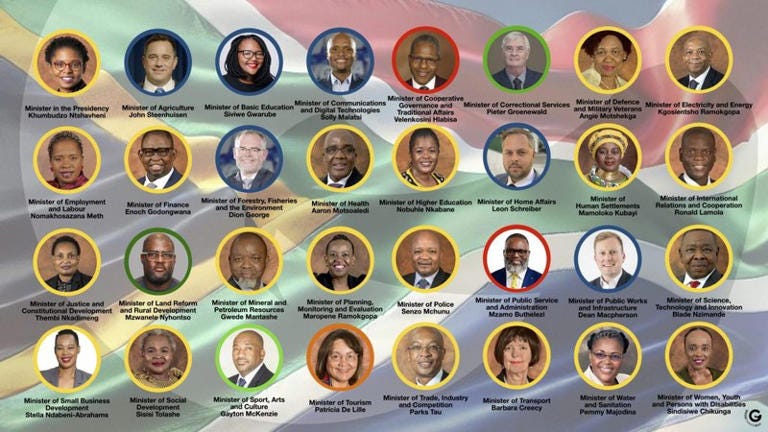In a historic turn of events, the recent South African elections have resulted in the formation of a Government of Unity, comprising the African National Congress (ANC), the Democratic Alliance (DA), and several smaller parties. This coalition marks a significant shift in the political landscape of the country, promising both challenges and opportunities for its legal framework and business environment.
A New Era of Governance
The ANC, which lost its parliamentary majority for the first time since the end of apartheid, has embarked on a power-sharing arrangement with its long-time rival, the DA, and other parties like the Inkatha Freedom Party (IFP) and the Patriotic Alliance. This coalition is not merely a temporary political arrangement but a substantial effort to stabilize governance by including a broad spectrum of political voices.
The essence of a Government of Unity lies in its inclusive approach, ensuring that major policy decisions are made collaboratively. This inclusivity aims to prevent any single party from imposing its agenda unilaterally, fostering a more balanced and representative governance structure. However, this comes with the inherent risk of political deadlock, especially on contentious issues like budget allocations and major legislative reforms.
Legal Implications
The establishment of a Government of Unity is expected to bring about profound changes in the legislative process. The requirement for consensus among diverse parties may lead to more comprehensive and debated laws, as opposed to the unilateral legislative approach often seen under a single-party majority. This could enhance the quality of legislation, as multiple perspectives and interests are considered.
However, the potential for political stalemate is a significant concern. With multiple parties holding different and sometimes conflicting ideologies, reaching agreements on critical legal reforms could prove challenging. This risk of deadlock might slow down the legislative process, affecting the timely implementation of necessary laws and policies.
Business Environment
For businesses, the new coalition government offers a mix of stability and uncertainty. On one hand, the DA’s pro-business stance could lead to the implementation of more business-friendly policies. These might include deregulation, tax incentives, and initiatives aimed at boosting investment and economic growth. The coalition’s emphasis on inclusive economic growth, infrastructure development, and job creation aligns with these goals, potentially creating a more favorable business climate.
On the other hand, the necessity for consensus in policy-making could lead to delays in enacting business-related reforms. Businesses may find the regulatory environment more stable but also slower to respond to emerging challenges and opportunities. The coalition’s ability to maintain cohesion and effectively manage policy differences will be crucial in determining the overall impact on the business sector (DW) (Nation).
Effects on Businesses and the Economy
For businesses, the formation of the GNU could bring both opportunities and uncertainties. On one hand, the coalition's focus on economic reform and development may lead to policies that promote investment, job creation, and economic growth. The presence of business-friendly parties like the DA could result in more favorable regulatory conditions and incentives for both local and international investors.
On the other hand, the inherent complexities of a coalition government could lead to policy inconsistencies and delays in implementation. Businesses will need to navigate a more complex political environment, requiring adaptability and strategic planning to mitigate risks associated with potential policy shifts.
The New Cabinet
The new cabinet under the GNU reflects a blend of leaders from various political backgrounds, aiming to represent a wide array of interests and perspectives. Here are some key appointments:
Deputy President: Paul Mashatile (ANC)
Minister of Agriculture: John Steenhuisen (DA)
Minister of Basic Education: Siviwe Gwarube (DA)
Minister of Communications and Digital Technologies: Solly Malatsi (DA)
Minister of Cooperative Governance and Traditional Affairs: Velinkosi Hlabisa (IFP)
Minister of Defence and Military Veterans: Angie Motshekga (ANC)
Minister of Finance: Enoch Godongwana (ANC)
Minister of Health: Aaron Motsoaledi (ANC)
Minister of Home Affairs: Leon Schreiber (DA)
Minister of Police: Senzo Mchunu (ANC)
Minister of Public Works and Infrastructure: Dean Macpherson (DA)
Minister of Trade, Industry and Competition: Parks Tau (ANC)
Minister of Tourism: Patricia De Lille (GOOD)
Economic and Social Policies
The unity government has outlined a “basic minimum program of priorities” which includes rapid and inclusive economic growth, promotion of fixed capital investment, industrialization, job creation, land reform, infrastructure development, and fiscal sustainability. This comprehensive agenda reflects the coalition’s commitment to addressing South Africa’s most pressing issues: poverty, unemployment, and inequality .
The inclusion of smaller parties like the IFP and the Patriotic Alliance adds to the diversity of the coalition, ensuring that different community interests are represented. This could lead to more holistic and socially cohesive policies, albeit with the risk of increased complexity in governance.
Conflict of Interest: Business Policies and International Relations
A significant challenge facing the GNU is the stark contrast in business policies and international relations stances between the ANC and the DA. The DA is known for its pro-business approach, advocating for policies that foster a more conducive environment for investment and economic growth. This includes deregulation, tax incentives, and a focus on innovation and technological advancement. The DA's business-friendly policies are supported by influential figures and entities like the Oppenheimers, who have substantial investments in the South African economy (The Citizen).
In contrast, the ANC has traditionally adopted a more interventionist approach, emphasizing social equity, land reform, and state involvement in the economy. The ANC's policies are often geared towards addressing historical injustices and redistributing wealth and resources. This ideological divide extends to international relations, where the DA's support for Israel contrasts sharply with the ANC's alignment with Palestinian causes and broader anti-imperialist stances (The Citizen) .
These differences could lead to significant policy clashes within the GNU, particularly in areas such as foreign investment, trade agreements, and international diplomacy. The ANC's push for more state control and redistribution could conflict with the DA's market-oriented reforms, potentially leading to inconsistent policy directions that could unsettle investors and businesses.
Conclusion
South Africa’s new Government of Unity represents a bold experiment in coalition governance, with far-reaching implications for the country's legal and business environments. While it promises a more inclusive and balanced approach to policy-making, the inherent challenges of maintaining cohesion among diverse political entities cannot be overlooked. The success of this coalition will largely depend on its ability to navigate these challenges, fostering stability and growth in a nation striving to overcome deep-seated socio-economic issues.
Stay tuned to The Justice Juta for ongoing analysis and updates on this evolving political landscape, and its impacts on law and business in South Africa.






I am proud of you